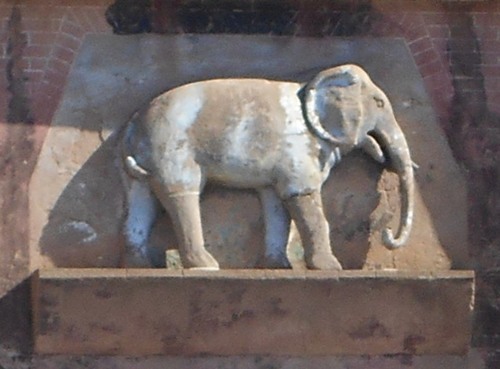Books by
Michael Barr
Order Here: |
|
The
White Elephant was hands down the most popular name for a saloon in
19th century Texas. There were White Elephant Saloons in Abilene,
Austin, Brownsville,
Brenham, Bryan,
Denison,
El Paso,
Lampasas, Laredo,
Mobeetie and Wichita
Falls.
The name was so familiar to Texans, it could have been a franchise.
The White Elephant Saloon in San
Antonio was on the north side of the Main Plaza near San Fernando
Church. At the White Elephant Saloon in Fort
Worth, gunfighter Luke
Short got crossways with Longhaired Jim Courtright. Short drew
first and gave Courtright the longest funeral procession the city
of Fort Worth had
ever seen. That was the long and short of it. |
The White Elephant
Saloon in Fredericksburg
Photo
courtesy Michael
Barr, November 2018 |
The White Elephant
Saloon at 242 East Main Street in Fredericksburg
may have been the classiest joint of any saloon in Texas that carried
the name. John Kleck built it in 1888. The outside walls are cut limestone
with 3 double doors in front and ornamental wrought iron railing along
the top. Until 1938 there was a wooden gallery out front.
Inside the building, the long wooden bar was along the west wall.
There was a large mirror on the back wall with an ice chest underneath
to keep the beer kegs cold. There was a cistern under the floor near
the front of the building.
Carbide lights lit up the bar at night. Later workers installed electric
lights when Pfeil's power plant made electricity available.
To put the finishing touch on the front of his fancy saloon, John
Kleck hired two stonemasons, A. W. Petmecky and a man named Thompson,
to carve or mold an elephant and attach it to the outside wall above
the middle door.
That assignment proved to be a tall order. Images of elephants were
hard to find in the Texas
Hill Country.
As luck would have it there was at the time a merry-go-round on Market
Square operated by a gentleman from Italy. For a small fee children
could ride around in a circle on the backs of wooden animals from
around the world. One of the animals was an elephant.
Petmecky and Thompson made an imprint of the elephant by pressing
it into a large container of moist sand. Then they poured cement containing
lime into the imprint to form the elephant we see today. |
 |
The White Elephant
Photo courtesy Michael
Barr, November 2018 |
In 1893 John
Kleck leased the building to saloonkeepers John Klaerner and Henry
Langerhans for $25 a month, but there was an interesting provision
in the lease that allowed Kleck to terminate the agreement if the
railroad came to town.
Klaerner and Langerhans bought the contents of the saloon for $1400
- $400 cash and a $1,000 loan. Business was good. They paid off the
loan in less than a year.
The White Elephant Saloon served the men of Fredericksburg
until Prohibition. Over the next 50 years the building housed a tractor
and farm implement company, a grocery store, a barbershop and a dealership
for Hudson-Essex automobiles.
The origin of the name White Elephant comes from Southeast Asian culture.
White elephants were sacred in that part of the world. They were pampered
and did no work of any kind. By the time the term arrived in America
it had come to mean, sometimes in a tongue and cheek sort of way,
an expensive but worthless investment.
The name White Elephant may also relate to the phrase 'seeing the
elephant" - a 19th century expression that referred to a great adventure.
Some sources in Fredericksburg
say the name came from a custom in parts of Germany where a white
elephant was a symbol for an eating and drinking establishment.
Because frontier saloons were segregated, the color white also had
racial overtones. There were Black Elephant Saloons in Fort
Worth, Brenham,
Austin, Houston
and San Antonio that
catered to Black Americans.
Saloons thrived in Texas until Prohibition hit the booze industry
like a herd of elephants.
When the White Elephant Saloon in San
Antonio closed, a local newspaper wrote with a noticeable tone
of sadness, "When the boys come to San Antone they can't milk the
elephant anymore." |
© Michael
Barr
"Hindsights" January
15, 2019 Column
Sources:
"Historic Store Front Razed," Fredericksburg Standard, February
17, 1938.
"Bicentennial Minutes for Gillespie County," Fredericksburg Standard,
July 21, 1976.
"White Elephant Saloon - Main Eye Catcher," Fredericksburg Standard,
July 2, 1975.
Richard Spelcer, "Fort Worth's White Elephant Saloon," Wild West
Magazine, October 2003.
AncestorPuzzles.com, April 18, 2016, The Black Elephant Saloon. |
|
|
